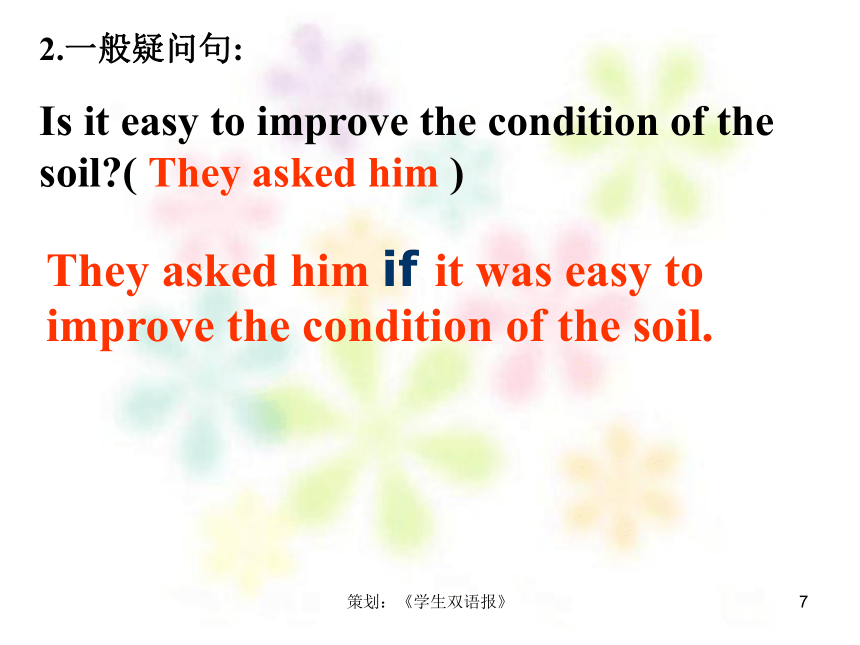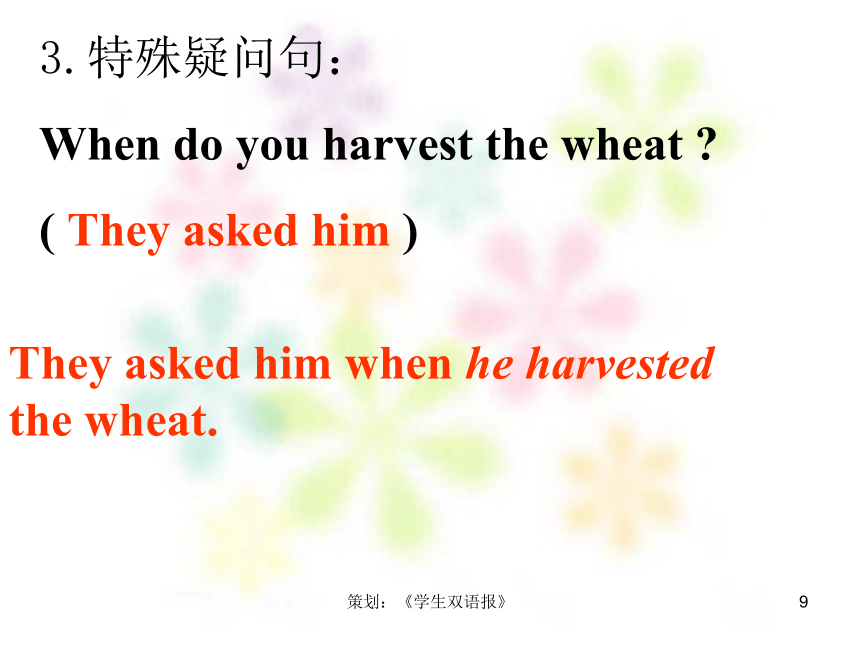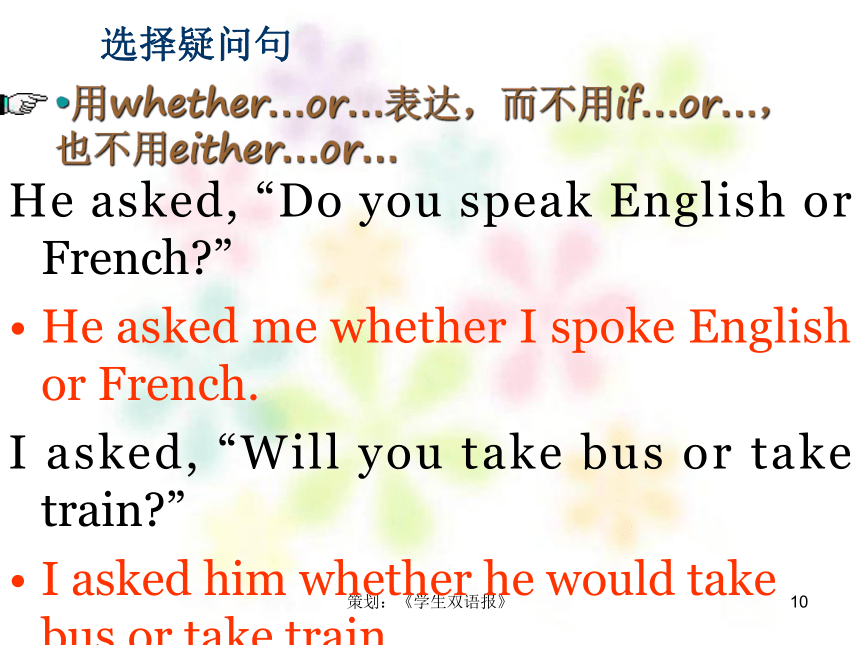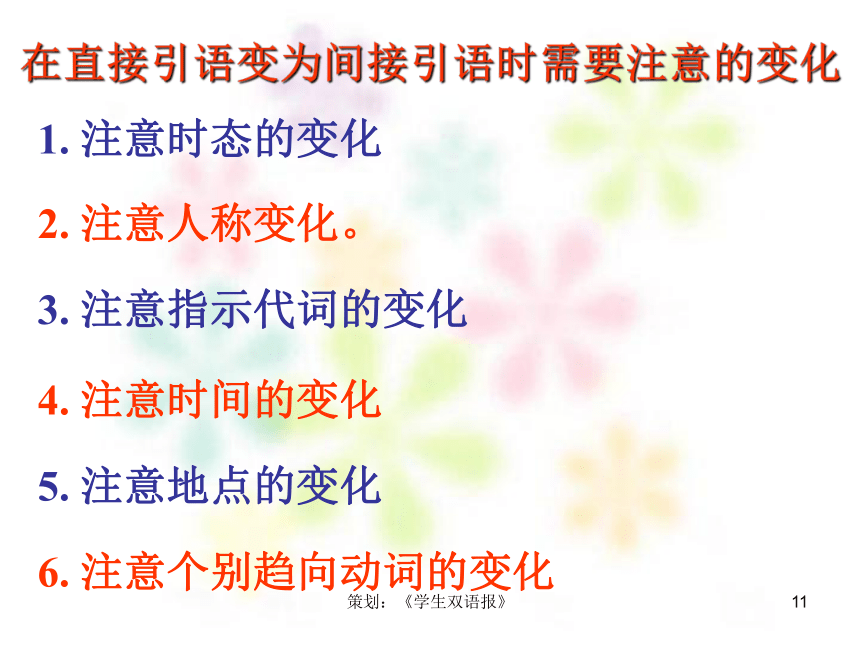friendship[上学期]
文档属性
| 名称 | friendship[上学期] |  | |
| 格式 | rar | ||
| 文件大小 | 109.8KB | ||
| 资源类型 | 教案 | ||
| 版本资源 | 人教版(新课程标准) | ||
| 科目 | 英语 | ||
| 更新时间 | 2006-11-05 10:47:00 | ||
图片预览












文档简介
课件39张PPT。策划:《学生双语报》1 Unit 1 Friendship人教版高中英语模块一策划:《学生双语报》2I want to find the answer to the question
What is friendship?
When it rains, I think friendship is a small umbrella.
It can give me a piece of clear sky.
When I’m crying, I think friendship is a white handkerchief.
It can wipe my tears dry.What is friendship?策划:《学生双语报》3When I am sad, I think friendship is a warm word.
It can bring me happiness again.
When I am in trouble, I think friendship is a strong hand.
It can help me escape my troubles.
When I sit in a quiet place, I think friendship is a very wonderful feeling.
It can’t be pulled and torn, because it is in everyone’s heart.
It is there from the beginning to the end of our lives.
策划:《学生双语报》4Language points
for Reading I策划:《学生双语报》5直接引语变成间接引语,句子结构的变化 He said, “I have been to the Great Wall. ”
He said to us that he had been to the Great Wall.
He said, “I'll give you an examination next Monday. ”
He told us that he would give us an examination the next Monday. 陈述句策划:《学生双语报》6一般疑问句 He said, “Do you have any difficulty with pronunciation?”
He asked (me) whether/if I had any difficulty with my pronunciation.
He said, “You are interested in English, aren't you?”
He asked whether I was interested in English. 间接引语用连词whether或if引导,原主句中谓语动词said要改为asked(me/him/us等),语序是陈述句的语序
策划:《学生双语报》72.一般疑问句:
Is it easy to improve the condition of the soil?( They asked him )They asked him if it was easy to improve the condition of the soil.策划:《学生双语报》8特殊疑问句 He said to me,“What's your name?”
He asked me what my name was.
He asked us, “How many car factories have been built in your country?”
He asked us how many car factories had been built in our country. 策划:《学生双语报》93.特殊疑问句:
When do you harvest the wheat ?
( They asked him )They asked him when he harvested the wheat.策划:《学生双语报》10选择疑问句 He asked, “Do you speak English or French?”
He asked me whether I spoke English or French.
I asked, “Will you take bus or take train?”
I asked him whether he would take bus or take train. 用whether…or…表达,而不用if…or…,也不用either…or… 策划:《学生双语报》115. 注意地点的变化在直接引语变为间接引语时需要注意的变化1. 注意时态的变化2. 注意人称变化。3. 注意指示代词的变化4. 注意时间的变化6. 注意个别趋向动词的变化策划:《学生双语报》12The geography teacher told us that the sun rises in the east and sets in the west.谓语动词时态变化需要注意几点:1.直接引语表述的是客观真理,变为间接引语时,时态不变The geography teacher said, “The sun rises in the east and sets in the west.”策划:《学生双语报》13She says that she’ll never forget the days in the country.2. 如果直接引语所表述的内容在目前和说话时同样有效,变间接引语时,时态可不变The children said, “We love this game.”They told us that they love that game.3.主句谓语动词的时态是现在时态,在引述时,时态不变。She says, “I’ll never forget the days in the country.”策划:《学生双语报》14 直接引语 间接引语
指示代词 时 间 状 语 地点状语 方向性动词 this, that, these those
now, then, today that day
this week that week yesterday the day before
last week the week before
four days ago four days before the day before yesterday two days before
tomorrow the next day
next month the next month
here there
come, go,bring take 策划:《学生双语报》15Exercises:1. He said , “I m afraid I can’t finish this work.”2.He said , “I haven’t heard from him since May.”
3.Tom said “I will see you next week.”
He said that he was afraid he couldn’t finish that work.He said that he hadn’t heard from him since May.Tom said that he would see me the next week.策划:《学生双语报》164. “Why were you late again?” The teacher said to me.
5. “I don’t like swimming,” said Sarah.
6. His friends asked him if he would go to Dalian.
7. “Have you been to Paris?” My classmate asked me.The teacher asked me why I was late again.Sarah said she didn’t like swimming.His friends asked him, “Will you go to Dalian?”My classmate asked me if I had been to Paris.策划:《学生双语报》17Readers can ________ quite well without knowing the exact meaning of each word.
A. get over B. get in
C. get along D. get through高考链接C策划:《学生双语报》182. It’s hard for me to imagine what I would be doing today if I ______ in love, at the age of seven, with the Melinda Cox Library in my hometown.
A. wouldn’t have fallen
B. had not fallen
C. should fall
D. were to fall高考链接B策划:《学生双语报》193. Father went to his doctor for _______ about his heart trouble.
A. an advice B. advice
C. advices D. the advices高考链接B策划:《学生双语报》204. I wonder how he ____ that to the teacher.
A. dare to say B. dare saying
C. not dare say D. dared say高考链接D策划:《学生双语报》21Proverbs about friends and friendship.A friend in need is a friend indeed.
Friends are like wine; the older, the better.
When you meet your friend, your face shines----you have found gold.
A friend to all is a friend to none.
The same man cannot be both friend and flatterer.
The best mirror is an old friend.
策划:《学生双语报》22
False friends are worse than open enemies.
Friendship cannot stand always on one side.
The friendship that can end was never real.
With clothes the new are best; with friends the old are the best.
策划:《学生双语报》23
1.?go through 经历
go through two stages
go through the test in class struggle
The poor girl has gone through a lot since her parents died.Language points for Reading策划:《学生双语报》24 ?
2. or =otherwise3.?hide(hid, hidden) away4. set down=write downI set down everything that happened then.策划:《学生双语报》255. series (单复同形)
a series of + n (pl) There is a television series on this channel every night.a series of good harvests/ questions/ Long March memorial stampsThere has been a series of car accidents at the crossing. 策划:《学生双语报》266.?as 正如, 照……的方式1) Do as I say.2) David, as you know, is a photographer.3) As I said in my last letter,I’m taking the exam in July.
策划:《学生双语报》277.?be/ get/ grow crazy about…1) The boy is crazy about skiing. 2) The teenagers are crazy about the pop singer.be crazy to do sth1) You are crazy to do such a thing.2) You are crazy to buy a car at such a high price.= It’s crazy of you to buy a car at such a high price.策划:《学生双语报》289.?stay (link v) + adj/ n1) I stayed awake through the stormy night.2) He stayed single all his life.3) The weather stayed sultry.天气持续闷热。4) Stay seated!坐在那别动!策划:《学生双语报》29 10.?do sth on purposeI think she lost the key on purpose.do sth with/ for the purpose of…He took along one of his pictures with the purpose of finding a job.策划:《学生双语报》30 = He went to town in order that he could sell the painting. 11. in order to = so as toHe went to town in order to sell the painting.策划:《学生双语报》3112. much too + adj/ adv
too much (+ un) = more than enoughShe is afraid that the trip will be too much for me.
He doesn’t talk too much.
The dress is much too long for me.
I got into the taxi and the driver started off at once and drove much too fast. It’s much too hot.策划:《学生双语报》32 13.?happen vi.1) What time did the accident happen?2) No one know who had fired the gun— it all happened so quickly.sb. happen to do sth. (似乎)碰巧= to be or as if by chanceI happened to see her on my way to work.If you happen to find it, please let me know.It happens/ happened that clauseIt happened that they went out when I called.策划:《学生双语报》3314.?hold/ have sb in one’s power 控制住/ 摆布某人 15. It’s the first/ second time that 某人第一/二次做The thundering clouds held me entirely in their power.It was the first time in a year and a half that I’d seen the night face to face.策划:《学生双语报》3417. lonely & alone1)He has been very lonely since his wife left him.
2) She lives alone.
3) The gloves alone cost $80.策划:《学生双语报》35 lonely: unhappy because of being alone or without friends 孤独的,寂寞的alone: 1) without any friends or separated from others 单独的
2) only 仅仅,只有。用于名词或代词之后。策划:《学生双语报》36leave/let sb or sth alone Not take, touch or interfere with sb. or sth. 不带走,不触摸,不干涉某人或某事1) 不要动,那时我的东西。Leave that alone. It’s mine.2) 她要求不要打扰她。She has asked to be left alone.策划:《学生双语报》3718. dare But as the moon gave far too much light, I didn’t dare open a window.dare具有情态动词和一般动词两种用法。策划:《学生双语报》38He dares to do most things, but he doesn’t dare to do this.
He dared to do that and something even worse.
We could see he dared not tell the truth.
Dare she tell them what she knows?
How dare you say so?
在肯定句中的dare, dares, dared之后,不定式一般加to。2) 在否定句中和疑问句中的dare之后,不定式一般不加to。策划:《学生双语报》393) 在用do或does构成的否定句和疑问句中,理论上虽然应当有to, 实际使用却经常把to省略.We did not dare (to) tell him that he had failed again this time.
Does he dare (to) go out at night in such stormy weather?
What is friendship?
When it rains, I think friendship is a small umbrella.
It can give me a piece of clear sky.
When I’m crying, I think friendship is a white handkerchief.
It can wipe my tears dry.What is friendship?策划:《学生双语报》3When I am sad, I think friendship is a warm word.
It can bring me happiness again.
When I am in trouble, I think friendship is a strong hand.
It can help me escape my troubles.
When I sit in a quiet place, I think friendship is a very wonderful feeling.
It can’t be pulled and torn, because it is in everyone’s heart.
It is there from the beginning to the end of our lives.
策划:《学生双语报》4Language points
for Reading I策划:《学生双语报》5直接引语变成间接引语,句子结构的变化 He said, “I have been to the Great Wall. ”
He said to us that he had been to the Great Wall.
He said, “I'll give you an examination next Monday. ”
He told us that he would give us an examination the next Monday. 陈述句策划:《学生双语报》6一般疑问句 He said, “Do you have any difficulty with pronunciation?”
He asked (me) whether/if I had any difficulty with my pronunciation.
He said, “You are interested in English, aren't you?”
He asked whether I was interested in English. 间接引语用连词whether或if引导,原主句中谓语动词said要改为asked(me/him/us等),语序是陈述句的语序
策划:《学生双语报》72.一般疑问句:
Is it easy to improve the condition of the soil?( They asked him )They asked him if it was easy to improve the condition of the soil.策划:《学生双语报》8特殊疑问句 He said to me,“What's your name?”
He asked me what my name was.
He asked us, “How many car factories have been built in your country?”
He asked us how many car factories had been built in our country. 策划:《学生双语报》93.特殊疑问句:
When do you harvest the wheat ?
( They asked him )They asked him when he harvested the wheat.策划:《学生双语报》10选择疑问句 He asked, “Do you speak English or French?”
He asked me whether I spoke English or French.
I asked, “Will you take bus or take train?”
I asked him whether he would take bus or take train. 用whether…or…表达,而不用if…or…,也不用either…or… 策划:《学生双语报》115. 注意地点的变化在直接引语变为间接引语时需要注意的变化1. 注意时态的变化2. 注意人称变化。3. 注意指示代词的变化4. 注意时间的变化6. 注意个别趋向动词的变化策划:《学生双语报》12The geography teacher told us that the sun rises in the east and sets in the west.谓语动词时态变化需要注意几点:1.直接引语表述的是客观真理,变为间接引语时,时态不变The geography teacher said, “The sun rises in the east and sets in the west.”策划:《学生双语报》13She says that she’ll never forget the days in the country.2. 如果直接引语所表述的内容在目前和说话时同样有效,变间接引语时,时态可不变The children said, “We love this game.”They told us that they love that game.3.主句谓语动词的时态是现在时态,在引述时,时态不变。She says, “I’ll never forget the days in the country.”策划:《学生双语报》14 直接引语 间接引语
指示代词 时 间 状 语 地点状语 方向性动词 this, that, these those
now, then, today that day
this week that week yesterday the day before
last week the week before
four days ago four days before the day before yesterday two days before
tomorrow the next day
next month the next month
here there
come, go,bring take 策划:《学生双语报》15Exercises:1. He said , “I m afraid I can’t finish this work.”2.He said , “I haven’t heard from him since May.”
3.Tom said “I will see you next week.”
He said that he was afraid he couldn’t finish that work.He said that he hadn’t heard from him since May.Tom said that he would see me the next week.策划:《学生双语报》164. “Why were you late again?” The teacher said to me.
5. “I don’t like swimming,” said Sarah.
6. His friends asked him if he would go to Dalian.
7. “Have you been to Paris?” My classmate asked me.The teacher asked me why I was late again.Sarah said she didn’t like swimming.His friends asked him, “Will you go to Dalian?”My classmate asked me if I had been to Paris.策划:《学生双语报》17Readers can ________ quite well without knowing the exact meaning of each word.
A. get over B. get in
C. get along D. get through高考链接C策划:《学生双语报》182. It’s hard for me to imagine what I would be doing today if I ______ in love, at the age of seven, with the Melinda Cox Library in my hometown.
A. wouldn’t have fallen
B. had not fallen
C. should fall
D. were to fall高考链接B策划:《学生双语报》193. Father went to his doctor for _______ about his heart trouble.
A. an advice B. advice
C. advices D. the advices高考链接B策划:《学生双语报》204. I wonder how he ____ that to the teacher.
A. dare to say B. dare saying
C. not dare say D. dared say高考链接D策划:《学生双语报》21Proverbs about friends and friendship.A friend in need is a friend indeed.
Friends are like wine; the older, the better.
When you meet your friend, your face shines----you have found gold.
A friend to all is a friend to none.
The same man cannot be both friend and flatterer.
The best mirror is an old friend.
策划:《学生双语报》22
False friends are worse than open enemies.
Friendship cannot stand always on one side.
The friendship that can end was never real.
With clothes the new are best; with friends the old are the best.
策划:《学生双语报》23
1.?go through 经历
go through two stages
go through the test in class struggle
The poor girl has gone through a lot since her parents died.Language points for Reading策划:《学生双语报》24 ?
2. or =otherwise3.?hide(hid, hidden) away4. set down=write downI set down everything that happened then.策划:《学生双语报》255. series (单复同形)
a series of + n (pl) There is a television series on this channel every night.a series of good harvests/ questions/ Long March memorial stampsThere has been a series of car accidents at the crossing. 策划:《学生双语报》266.?as 正如, 照……的方式1) Do as I say.2) David, as you know, is a photographer.3) As I said in my last letter,I’m taking the exam in July.
策划:《学生双语报》277.?be/ get/ grow crazy about…1) The boy is crazy about skiing. 2) The teenagers are crazy about the pop singer.be crazy to do sth1) You are crazy to do such a thing.2) You are crazy to buy a car at such a high price.= It’s crazy of you to buy a car at such a high price.策划:《学生双语报》289.?stay (link v) + adj/ n1) I stayed awake through the stormy night.2) He stayed single all his life.3) The weather stayed sultry.天气持续闷热。4) Stay seated!坐在那别动!策划:《学生双语报》29 10.?do sth on purposeI think she lost the key on purpose.do sth with/ for the purpose of…He took along one of his pictures with the purpose of finding a job.策划:《学生双语报》30 = He went to town in order that he could sell the painting. 11. in order to = so as toHe went to town in order to sell the painting.策划:《学生双语报》3112. much too + adj/ adv
too much (+ un) = more than enoughShe is afraid that the trip will be too much for me.
He doesn’t talk too much.
The dress is much too long for me.
I got into the taxi and the driver started off at once and drove much too fast. It’s much too hot.策划:《学生双语报》32 13.?happen vi.1) What time did the accident happen?2) No one know who had fired the gun— it all happened so quickly.sb. happen to do sth. (似乎)碰巧= to be or as if by chanceI happened to see her on my way to work.If you happen to find it, please let me know.It happens/ happened that clauseIt happened that they went out when I called.策划:《学生双语报》3314.?hold/ have sb in one’s power 控制住/ 摆布某人 15. It’s the first/ second time that 某人第一/二次做The thundering clouds held me entirely in their power.It was the first time in a year and a half that I’d seen the night face to face.策划:《学生双语报》3417. lonely & alone1)He has been very lonely since his wife left him.
2) She lives alone.
3) The gloves alone cost $80.策划:《学生双语报》35 lonely: unhappy because of being alone or without friends 孤独的,寂寞的alone: 1) without any friends or separated from others 单独的
2) only 仅仅,只有。用于名词或代词之后。策划:《学生双语报》36leave/let sb or sth alone Not take, touch or interfere with sb. or sth. 不带走,不触摸,不干涉某人或某事1) 不要动,那时我的东西。Leave that alone. It’s mine.2) 她要求不要打扰她。She has asked to be left alone.策划:《学生双语报》3718. dare But as the moon gave far too much light, I didn’t dare open a window.dare具有情态动词和一般动词两种用法。策划:《学生双语报》38He dares to do most things, but he doesn’t dare to do this.
He dared to do that and something even worse.
We could see he dared not tell the truth.
Dare she tell them what she knows?
How dare you say so?
在肯定句中的dare, dares, dared之后,不定式一般加to。2) 在否定句中和疑问句中的dare之后,不定式一般不加to。策划:《学生双语报》393) 在用do或does构成的否定句和疑问句中,理论上虽然应当有to, 实际使用却经常把to省略.We did not dare (to) tell him that he had failed again this time.
Does he dare (to) go out at night in such stormy weather?
